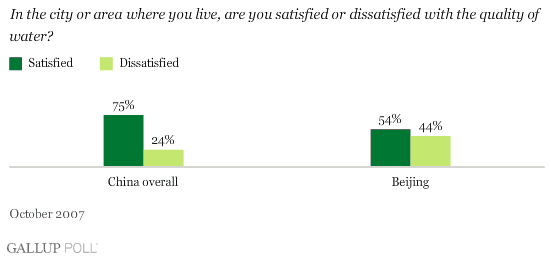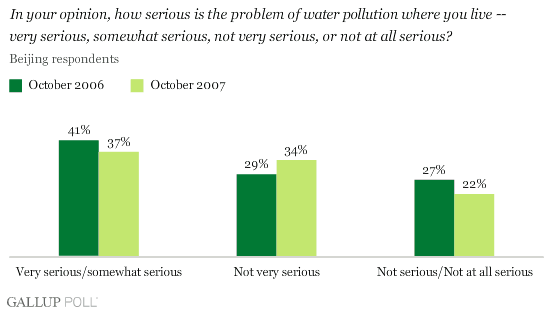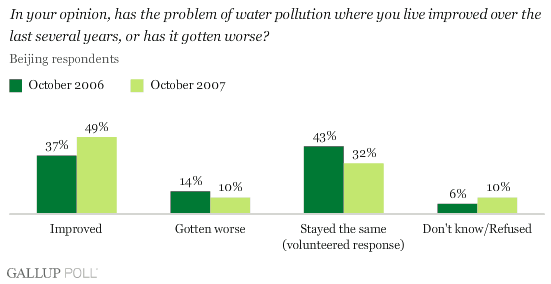WASHINGTON, D.C. -- Chinese government authorities have dedicated billions of yuan to improving water quality in Beijing leading up to the 2008 Summer Olympics. Of Beijing residents surveyed in October 2007, 44% say they are dissatisfied with the quality of water in their city, compared to 24% of Chinese citizens nationwide.

China's State Environmental Protection Administration (SEPA) estimates that up to 90% of the river water in Chinese cities is polluted. In Beijing, slightly more than one-third (37%) say water quality is a "very serious" or "somewhat serious" problem, which is similar to the 41% of Beijing respondents who said this in .

���۴�ýdata also reveal significant differences between the way urban and rural Chinese respondents view the problem of water pollution in the area where they live. Just over a third of urban respondents (37%) told ���۴�ýthat the problem of water pollution is "not serious" or "not at all serious" where they live, while 60% of Chinese who live in rural areas throughout China share this sentiment.
Efforts over the past few years to curb water pollution in Beijing have focused primarily on increasing the number and quality of wastewater treatment facilities and expanding water quality monitoring throughout the city. ���۴�ýPoll data collected over the past two years suggest that some Beijing residents are noticing an abatement of water pollution. In October 2006, 37% of Beijing respondents said the city's water pollution problem had improved in recent years. By October 2007, about half (49%) of Beijing respondents shared this view.

Urban Chinese respondents are also more likely than their rural counterparts to say the problem of water pollution where they live has improved. In 2007, 44% of urban Chinese respondents say that in recent years the water pollution problem has improved where they live, compared with only 28% of rural residents who say the same.
Survey Methods
Results are based on face-to-face interviews with 3,730 adults, aged 18 and older, in October 2006 and 4,175 adults in October 2007, aged 15 and older, in China. For results based on the total sample of national adults, one can say with 95% confidence that the maximum margin of sampling error is ±2 percentage points.
Results are based on face-to-face interviews with 422 adults, aged 18 and older, in October 2006 and 363 adults in October 2007, aged 15 and older, in Beijing. For results based on the total sample of national adults, one can say with 95% confidence that the maximum margin of sampling error is ±5 to ±6 percentage points.
In addition to sampling error, question wording and practical difficulties in conducting surveys can introduce error or bias into the findings of public opinion polls.
